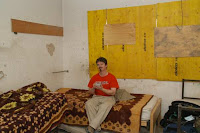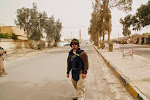







"Where do the Marines sleep? What type of rooms do they live in? Do they have to sleep outside on the ground? Do they have beds to sleep in? Do they have bathrooms and showers?" All these questions, and many more have been asked of me since I returned home from Iraq on 13 March from a 2+ week embed assignment in Fallujah and Ar Ramadi, Iraq.
I have posted some photographs to show everyone some of the quarters that John Wroblewski and I stayed in during our assignments in 2007 and 2008. Most of the photos (interior views, except the one of the 3 Marines) were taken at the JSS (Joint Security Station) on the east side of Ramadi. The photo of the three Marines was taken in our "container" trailer in Camp Fallujah (that was typical inside, except had additional amenities for journalists - the ONLY time I've seen this in my two visits to Iraq!)
Large military bases in Iraq (Baghdad International Airport, Green Zone in Baghdad, Fallujah, and Ar Ramadi) have mess halls whose hours vary based upon location and demand. Generally, they serve four meals daily from 0600 - 0800, 1100-1300, 1700-1900, and 2300 - 0100.) On some bases, the food selections were extensive and tasty. However, there were other locations that were difficult, if not impossible to reach, due to work schedules and the distances involved in getting to the mess hall. For instance, the mess hall at Camp Ramadi was exceptional in its choices and quality, but John and I had to walk about 20 minutes just to get there from our quarters! Also, the large bases in Kuwait have fast food outlets (KFC, Subway, Pizza Hut, and McDonald's.) Of these, I think that McDonald's is the only 24/7 operation (although this may have changed since my first visit in January 2007.)
When we were stationed at the JSS (Joint Security Station) in Ramadi, the Marines and Iraqi Police unit there were only given one hot meal per day, delivered in an insulated hotbox around 1700. Other choices were food contained within freezers that could be microwaved in the lone microwave oven, Pop Tarts, lunch meats and cheeses for sandwiches, and pre-packaged muffins and pastries stacked around the "kitchen" area. Try to imagine a college or fraternity dormitory (or roommate situation) where it's a "free-for-all" at meal time (30 to 50 people in a 20x30 room with four 3x8 ft tables), yet the military discipline (and the fact that everyone carries automatic weapons) encourage responsibility within the residents.
Bases (other than the JSS's) have recreation centers (with 30 minute internet limits per session, although there may be a long wait after signing in at certain times), PXs (Post Exchanges) where troops have access to purchase items from a decent inventory, laundry (free, but a two day minimum wait), and hot showers (although Marine bases insist upon "Navy showers", where you only run the hot water to get wet, and to rinse off the soap.) I've been at Army bases where this discipline was enforced via small hot water heaters! If you wanted hot water, you had to conserve during the process.
Regardless of whether you are hungry, dirty, or have to go to the restroom, a walk is required to accomplish this task. Walking is just fine if the weather is nice, but imagine walking 20 minutes to the Mess Hall for lunch if it's raining or it's 120 degrees Fahrenheit!!
Folks, we have it incredibly easy here in the States, as compared to the brave men and women that volunteered to serve in our Armed Forces, and many of our troops have done so repeatedly within the last four to six years.
"Other" non-military (IE: journalist/media) issues: Due to the "transient" nature of the environment (both within transitional housing, and on any base), I would not recommend that anyone leave any important (valuable) gear unattended at any time. During the 8 days or so that I've spent at the main base in Kuwait awaiting transportation into/out of Iraq, there is a formal operation in place to assign sleeping quarters. This operation is very efficient and well run.
However, due to the transitional nature of the travelers (usually contract employees of varying nationalities and backgrounds, including U.S. citizens) and the lack of security within individual tents, leaving gear unattended is asking for trouble. Recognizing this issue during both embed assignments, John and I took turns watching each other's gear if one or the other of us had to leave our tent for any reason. This worked fine unless we both had to leave the tent at the same time! If this unusual challenge presented itself, we would carry all our gear to the PAO office, and ask a trusted PAO (Public Affairs Officer) to monitor our gear until we returned. (Thank you Arcent PAO team for all your help!!)
Another alternative was to carry all of your equipment with you at all times. This works well, until you come to the DFACS (Mess Hall), where NO outside bags are allowed into the venue. In other words, I've encountered some inspiring, conscientious individuals, and others that I felt might steal everything I had if given the opportunity.
If anyone has any questions about living conditions (and I could go on for another hour or so to describe all the possible scenarios - especially in Iraq and some of the COPs and JSSs), please email or comment and I will get back to you as soon as possible.
